#Tracking Revenue and Expenses
Explore tagged Tumblr posts
Text
Starting a new business venture is an exhilarating journey, but it’s crucial to lay a strong financial foundation from the outset. This begins with understanding the fundamentals of startup accounting.
#Introduction to Startup Accounting#What is Startup Accounting?#Why is Startup Accounting Important?#Setting Up Your Accounting System#Choosing the Right Accounting Software#Establishing a Chart of Accounts#Understanding Basic Accounting Principles#Managing Startup Finances#Budgeting for Startup Expenses#Tracking Revenue and Expenses#Cash Flow Management#Tax Planning for Startups
0 notes
Text
youtube
The InnKey Manager App is designed for hotel owners and managers, delivering real-time performance data and dynamic reporting. Easily track and compare revenue by property, check room availability, and monitor performance across various locations. Access cash flow insights and receive instant notifications for quick responses, all while leveraging Operational Profit & Loss reports for informed decision-making.
Download the App:
Android: https://play.google.com/store/apps/details?id=io.innkeypms.managerapp
iOS: https://apps.apple.com/sa/app/innkey-managers-app/id1585349677
Stay Connected:
Website: https://www.innkeypms.net
Subscribe to our YouTube channel:
https://www.youtube.com/channel/UCeZKQty1ChHMepOQAwTErww
#Manager App#InnKey Manager App#Hotel Performance Report#Revenue Report#Room Availability#Operational P&L Report#Account Receivables Management#Hotel Operations Notification#Hotel Operations Alert#Hotel Management App#Real-Time Hotel Insights#Multi-Property Hotel Management#Hospitality Revenue Tracking#Hotel Room Availability#Customized Hotel Alerts#Hotel Expense Tracking#Streamline Hotel Operations#Hospitality Business Growth#Youtube
0 notes
Text
Financial Survival Tips to Help New Owner-Operators
We are starting a new series here on the blog. We want to talk to and help new owner-operators understand what exactly is involved with running a trucking business. We have identified 10 areas that cause issues for new owners, so we will address each one individually here. Since FRC was founded to help independent truckers succeed in an unfriendly economy, we hope that by talking about each of…
#budgeting for truckers#budgeting fuel costs#business#cash flow management#financial health trucking#financial planning trucking#Freight#freight industry#Freight Revenue Consultants#fuel cost savings#fuel costs trucking#logistics#managing cash flow trucking#new owner-operators#new trucking business#owner-operator budget#owner-operator finances#small carriers#Transportation#truck maintenance budget#truck maintenance tips#trucker cash flow#trucker expense tracking#trucker financial tips#trucker payment terms#Trucking#trucking business startup#trucking cash flow tips#trucking cost management#trucking expenses guide
1 note
·
View note
Text
From Startup to Success: How Moolamore Cash Flow Forecasting Can Boost Your Business
Wishing you could predict cash flow fluctuations with remarkable accuracy and make brilliant decisions to propel your SME company to unprecedented success?

Say goodbye to all your worries! There is a solution on the way! Enter the revolutionary Moolamore cash flow tool into the picture! Join us on this journey from startup to success as we discover how Moolamore can improve your financial management and decision-making processes! Make sure to read this blog to the end!
#cash flow forecasting for startup#cash flow forecasting tool#best cash flow forecasting software#financial forecasting software#budgeting tool#financial planning software#cash flow management tool#money management tool#business forecasting software#revenue forecasting tool#financial analysis tool#expense tracking software
0 notes
Text
The stereotype of a Bad Tax Client is probably the self-employed individual who brings you a bag of loose receipts. Now, those can be frustrating, but I find the ones who just hand you a bank/credit card statement to be so much worse.
It's usually safe to assume that any receipt the client stuffed in their bag is relevant, and easy to figure out why they made that business transaction. There's an itemized list of everything cash was spent on, after all! (And a lot of the receipt folks stick different categories of receipt into different bags.) It's just data entry.
Bank statements, though? You have to squint at the business name, maybe do some googling, and then guess why the business owner might have spent money there. Was he renting the space? Buying tickets? Purchasing an unusually large quantity of merchandise? Was it actually a business transaction at all, or did the client put personal purchases on a business credit card?
#income tax return#business#I wrote this post because of a specific egregious example#he has two (related) businesses employing close to a dozen people with 6-digit revenue#but apparently doesn't care enough to hire an accountant to track expenses month by month#or even make a basic-ass spreadsheet to keep track of his expenses#which I know he *can* do because he does that for his rental properties!#ugh#I don't know if he even looks at the spreadsheets we make for him#also he either tries to pass off checks he writes to himself from his business account off as a salary expense#that or he just. does not understand how sole proprietorships work.#I don't want to complain too much but I don't like the data divination he makes me do#bonus: he uses the same credit card for both businesses#yeah thanks I'll just allocate all of that to the more-established business#dunno why you made two LLCs in the first place
0 notes
Text
⊹₊⟡⋆ The Bet ⊹₊⟡⋆
Ryomen Sukuna x Female Reader x Gojo Satoru

⊹₊⟡⋆Masterlist ⊹₊⟡⋆
Warnings: Suggestive content. +18

Chapter 04
Yuuji stood outside the library, squinting at the glowing neon sign above the entrance. The clock on his phone read 6:58 PM. He groaned, glancing around the nearly deserted campus. “Why am I even here?” he muttered. Most students were either partying or relaxing—not trudging into a library on a Friday night. He shoved his hands into his hoodie pocket and pushed open the heavy glass door.
Inside, the library was quiet, almost hauntingly so. The rows of shelves stretched into the dim corners, and only a few desk lamps glowed faintly. He wandered deeper in, looking for anyone who might resemble a tutor.
“Is this Sukuna’s idea of a joke?” Yuuji muttered under his breath.
But then he saw you.
You were tucked away in the farthest corner, sitting at a table near the shelves. Glasses perched on your nose, a sweater too big for your frame draped over your shoulders, and baggy jeans swallowed your legs. Your hair was tied into a messy bun, and you were scribbling into a notebook with a focus that suggested you’d rather be anywhere but here.
Yuuji hesitated.
She looks serious…this is definitely not a prank.
He approached cautiously, the sound of his sneakers on the polished floor breaking the silence.
You glanced up as his shadow fell over your table. And for a split second, your stomach sank. His pink hair, sharp jawline, and even his stance—everything about him screamed Sukuna. The resemblance was uncanny, except for one thing: his expression. Where Sukuna’s was always distant, cold, or annoyed, this boy looked… approachable. Warm. Even friendly.
“Uh, are you my tutor?” he asked, tilting his head.
You stood, offering your hand. “That depends. Are you Yuuji Itadori?”
He grinned, shaking your hand. “That’s me! You can just call me Yuuji, though. Thanks for helping me out.”
As he settled into the chair across from you, you adjusted your glasses and opened your notebook. “Alright, let’s get started. You’re here for Principles of Financial Management, right?”
Yuuji nodded enthusiastically. “Yeah, I really need help. Like…badly.”
You chuckled softly, and his grin widened.

For the next two hours, the library filled with the sound of flipping pages, pens scratching on paper, and your patient explanations.
“Okay,” you began, pointing to a chart in the textbook. “This is the cash flow statement. It’s basically a summary of how cash moves in and out of a company over a period of time.”
Yuuji squinted at the page. “So…it’s like tracking how much money I spend on snacks versus how much I make babysitting?”
You raised an eyebrow. “Sure, if you’re running a business of snack consumption and babysitting profits. But yes, conceptually, that’s correct.”
He grinned. “See? I’m already learning!”
“Don’t get too confident yet,” you teased. “What’s the formula for free cash flow?”
Yuuji frowned, tapping his chin. “Uh…Revenue minus…expenses?”
“Close. Revenue minus operating expenses and capital expenditures. Write that down.”
He scribbled furiously in his notebook. “Got it. You’re really good at this, you know.”
You blinked, caught off guard. “At what?”
“Explaining stuff. Making it…not boring.”
You smiled, brushing off the compliment. “Thanks, Yuuji. Now, let’s move on to break-even analysis.”

By the time you glanced at the clock, it was past 9 PM. You closed the textbook with a soft thud and stretched your arms. “Alright, I think that’s enough for today.”
Yuuji leaned back in his chair, letting out a dramatic sigh. “You just saved my life. Seriously. I actually understand this stuff now!”
You smiled. “That’s the point of tutoring.”
He paused, then asked, “Do you have space for another session this week?”
You pulled out your agenda. “Let’s see…yes, I can fit you in on Thursday at the same time.”
“Perfect!” he said, watching as you wrote his name neatly in your planner.
As you packed up, Yuuji hesitated before speaking again. “Hey, are you going to Hakari’s party tonight?”
You shook your head. “No, that’s not really my thing.”
“Aw, come on,” he said, leaning forward. “It’s a Friday night! You should enjoy college a little.”
You laughed softly. “I enjoy it just fine without parties, thanks.”
“Think of it as a thank-you for helping me out,” he insisted, pulling out his phone. Before you could protest, he sent you the address.
“You really don’t have to do that,” you said, slightly flustered.
“Just think about it, okay?” he said with a grin as he stood. “Even if you just stop by for a little while, it’d be fun to see you there.”
You watched him walk away, his energy and cheerfulness lingering like a faint echo in the quiet library. Alone again, you sat back down, staring at your phone with the address he’d sent.
Should you go?
You sighed, placing your chin in your hands. For someone as outgoing as Yuuji, this party was probably the highlight of his week. For you, though? It was a step outside of your comfort zone.

When you enter your dorm, the space feels unusually quiet. Shoko isn’t there, her usual music or chatter missing, which only adds to the unease bubbling in your chest. You drop your bag on the bed and walk toward your desk, where a small mirror leans against the wall.
You sit down and open your modest makeup bag, staring at the contents for a moment. It’s been a while since you’ve done anything other than a little mascara, but tonight, curiosity wins. You pick out a soft lipstick, something subtle but noticeable, and carefully apply it.
Leaning back, you undo your messy bun, letting your hair tumble down in waves around your shoulders. For a moment, you study your reflection, unsure.
“Do I look okay for a party?” you whisper to yourself, smoothing down a stray strand of hair.
Then your eyes drop to your clothes: the oversized sweatshirt that swallows your frame and the baggy jeans that are more comfort than style. A familiar wave of self-consciousness hits.
You sigh, standing. This is ridiculous. You’re not a party person. What are you even thinking?
Just as you’re about to give up and call it a night, the door swings open. Shoko strides in, the click of her heels echoing on the floor. Her outfit is as bold as ever—short, sleek, and paired with smoky eye makeup that makes her look effortlessly cool.
“I forgot my purse and my cigarettes,” she says, scanning the room. She freezes when her eyes land on you, her lips curling into a knowing smirk. “Wait a minute… Lipstick? What’s going on here?”
You feel your face flush. “Nothing. I was just…thinking about going to the party.”
Shoko arches a brow, tossing her purse onto her bed. “Thinking? Girl, you’re either in or out. And judging by that sweatshirt, I’m guessing you’re about to chicken out.”
You fidget, glancing at your reflection again. “I don’t know, Shoko. I feel like I’ll be so out of place. I don’t even know what to wear to something like this.”
She crosses the room in two strides, studying you with a critical eye. Then she shakes her head dramatically. “Honey, this isn’t grandma’s tea party. That outfit? No.”
Before you can protest, Shoko dives into her closet with purpose. Hangers rattle and clothes fly until she emerges, triumphant, holding a tight, short black dress. She thrusts it toward you like a sacred artifact.
You blink at it, wide-eyed. “Shoko…that’s way too short.”
She laughs, a deep, throaty sound that fills the room. “That’s the point. Trust me. Just try it on. You’ve been hiding under all that fabric for too long.”
When you hesitate, she grabs a pair of sleek black heels from her closet and sets them beside the dress. “These too. Go on, the bathroom’s right there. I want a fashion show.”
Reluctantly, you take the dress and heels, muttering something about peer pressure as you shut the bathroom door.
When you finally step out, your heart pounds. The dress hugs your curves in all the right places, and the heels add just enough height to make you feel confident—but also a little exposed.
Shoko’s jaw actually drops. She blinks a few times, then grins like the Cheshire Cat. “Holy… Where have you been hiding that body? Damn, Y/N, if I looked like you, I’d be breaking hearts left and right.”
You tug at the hem of the dress nervously. “I feel…exposed.”
Shoko waves you off, pulling a lightweight cardigan from her closet and tossing it at you. “Here, for when you get cold. But don’t even think about putting it on until the party is over.”
You smile softly, holding the cardigan to your chest. “Thanks, Shoko.”
She smirks, grabbing her purse. “What are roommates for? Now come on, you’re sticking with me tonight. I’ll make sure you survive.”
You laugh, feeling a little of the tension ease. Maybe tonight won’t be so bad after all.

Hakari’s parents’ house was a sprawling suburban mansion, the kind of place that screamed “old money” and had probably never seen this much chaos before. Tonight, it was packed to the brim with college students. The bass from the sound system reverberated through the walls, and every room was teeming with people. The living room had been converted into a makeshift dance floor, where bodies swayed and moved under the glow of string lights and a rotating disco ball that Hakari had apparently borrowed from somewhere.
The kitchen was a disaster zone—red solo cups piled high, bottles of vodka, tequila, and mixers scattered across the counters. Someone was attempting to make cocktails but clearly had no idea what they were doing, judging by the grimaces from those brave enough to drink them. The backyard was just as packed, with clusters of people gathered around the pool, some dipping their feet in, others reclining on lawn chairs with drinks in hand.
Hakari had bragged all week about how his parents were conveniently “away on business,” leaving him the house. Of course, they thought he was hosting a small study group. Judging by the dozens of cars parked haphazardly down the street, they were in for a rude awakening if a single neighbor decided to call the cops.
Sukuna stood near the wall in the living room, nursing his drink and watching the chaos with mild amusement. He wasn’t a big fan of these kinds of parties anymore—too predictable, too loud—but Hakari had insisted, and Sukuna figured there were worse ways to spend a Friday night. He leaned against the wall, one hand in his pocket, his sharp gaze scanning the room with the cool indifference of someone who always looked like he was above the noise.
Then he spotted Yuuji weaving through the crowd, his bright pink hair making him impossible to miss. Trailing behind him were his ever-present sidekicks, Nobara and Megumi. Yuuji’s usual energy was dialed up even higher tonight, his grin so wide it practically lit up the dimly lit room.
“Hey, Sukuna!” Yuuji called out, raising a hand in greeting as he finally reached his older brother.
Sukuna barely shifted, taking another sip from his red cup. “What?” he asked, his tone as sharp as ever.
Yuuji wasn’t deterred in the slightest. “Just wanted to say thanks for hooking me up with that tutor. She’s great—really knows her stuff.”
“Good,” Sukuna said flatly. “You actually learning something, or are you just wasting her time?”
Yuuji groaned, rolling his eyes. “I’m learning, alright? Jeez. Why are you always so dramatic?”
Before Sukuna could fire back, Yuuji added casually, “Oh, by the way, I invited her to the party.”
Sukuna froze mid-sip, his eyes narrowing as he slowly lowered his cup. “You did what?”
“I invited her,” Yuuji repeated, grinning. “Thought it’d be a nice way to thank her, you know? Plus, she works too hard. She deserves to have some fun.”
Sukuna barked out a laugh, the sound sharp and humorless. “She’s not coming.”
Yuuji frowned. “How do you know?”
“Because she’s a nerd who lives in the library,” Sukuna said, his tone dripping with condescension. “This isn’t her scene. Trust me.”
Yuuji was about to argue when a new voice cut in.
“Yo, Sukuna!”
Gojo appeared out of nowhere, grinning ear to ear, holding a drink that looked suspiciously like it had more ice than actual liquid. He clapped Sukuna on the back with enough force to make him scowl.
“What do you want, Gojo?” Sukuna asked, clearly annoyed.
“Have you seen Geto?” Gojo asked, ignoring Sukuna’s tone entirely.
“No,” Sukuna replied, rolling his eyes. “And even if I did, I wouldn’t tell you.”
Gojo pouted dramatically. “You’ve really got to let this grudge go. It’s bad for your health, you know?”
Sukuna didn’t bother answering, taking another drink instead.
Meanwhile, Yuuji watched the exchange, grinning as he turned to Nobara and Megumi. “And you guys thought I had drama.”
The door opened wide, and Geto strolled in with his signature calm confidence, flanked by Shoko—whose outfit and energy screamed trouble—and…you.
Gojo, mid-laugh in a weak attempt to distract himself from his brewing nerves, froze. His grin slipped off his face like a melting snowman as his gaze landed on you. His heart skipped, then raced, and he quickly looked away, trying to play it cool. What were you doing here?
He had never seen you at a party before. Ever. This wasn’t your kind of scene—or so he thought. His mind raced. Were you dragged here by Shoko? Were you here because of someone? Was it him?
Gojo’s internal panic went unnoticed as he tried to inject himself into the conversation Yuuji was having with Sukuna, Nobara, and Megumi. His mouth moved, but his words were robotic, completely disconnected from his usual charm.
Meanwhile, Yuuji caught sight of you from across the room. His eyes widened in delight, and he immediately nudged Sukuna in the arm. “Told you she’d come! Man, I should’ve bet on it!”
Sukuna, who had been nursing his drink and half-listening to Yuuji, turned lazily in the direction his brother was pointing. And then he froze.
For a second, Sukuna genuinely thought his beer had been spiked. Was that…you?
It wasn’t like you looked unrecognizable. It was the same girl he’d seen in baggy jeans and oversized sweatshirts, usually with glasses sliding down your nose and a pen tucked behind your ear. But tonight? You were…different. The tight black dress hugged your body in ways Sukuna didn’t expect, and your legs seemed to go on forever under the dim, flashing lights.
The room felt like it shifted, the music blurring into static as Sukuna stood there, completely entranced. His usual sharp, cocky demeanor? Out the window. He didn’t even realize he was staring.
And he wasn’t the only one.
Gojo’s resolve to stay cool crumbled almost immediately. His eyes kept darting toward you despite his best efforts to focus elsewhere. Every time he caught sight of your dress, your hair, the way you looked slightly shy yet undeniably stunning, his face burned.
Across the room, Shoko—true to her energy—was having the time of her life, arm slung over your shoulder as she leaned in and whispered loudly enough for half the room to hear, “Everyone is staring at you!”
You winced, cheeks warming, and muttered back, “You don’t have to tell me. I can feel it.”
Shoko grinned devilishly, her confidence radiating. “That’s because you’re a total smoke show tonight, babe. Honestly, who knew all that was under those grandma sweaters?”
“Shoko!” you hissed, smacking her arm lightly.
She cackled, clearly enjoying your embarrassment, and leaned back to grab another drink from a passing tray. She started swaying to the music, trying to drag you into her rhythm. “Come on, let’s have fun!”
Meanwhile, Sukuna was still frozen. His eyes were glued to the way your dress hugged your curves, the way the lights hit your skin, the subtle confidence in your walk. He was so lost in thought that he didn’t even notice Gojo beside him, sneaking glances at you with the same dumbstruck expression.

Gojo wandered through the chaotic maze of Hakari’s house, dodging bodies dancing to the thumping bass and narrowly avoiding a girl who nearly spilled her drink on him. His sharp eyes scanned every corner until he spotted Geto leaning casually against a wall in the living room, his arm resting above a girl’s shoulder, his tone smooth as silk.
“Of course he’s flirting,” Gojo muttered to himself, sighing. Still, he made a beeline for him, determination fueling his long strides.
Geto glanced up mid-flirt, spotting Gojo’s disheveled and slightly panicked face approaching. He smirked, clearly amused. “Ah, Satoru. See what I brought you?”
Gojo ignored the girl completely, leaning in to whisper-yell, “Why didn’t you tell me you were bringing her?”
Geto raised a brow, his smirk widening. “What?” he chuckled. “I did stupid.”
Gojo rolled his eyes. “No, you did not.”
“First of all,” Geto said, holding up a finger, “I didn’t know she was Shoko’s roommate until I went to pick her up. Second—” He raised another finger, his smirk growing smug. “I texted you. Millions of times.”
“Bullshit,” Gojo snapped, immediately pulling out his phone. His thumb scrolled furiously through his notifications, his face dropping when he saw an embarrassing number of unread messages from Geto. He groaned, cursing under his breath. “Damn it.”
“Yeah, that’s what I thought,” Geto teased, taking a sip from his drink. “You really need to stop putting the none disturb mode.”
Gojo shot him a glare but quickly pivoted back to the issue at hand. “Okay, fine, you texted. But you could’ve called. You know how important this is!”
“Call you while she was in the car?” Geto raised an amused brow. “Let her know that you have liked her since middle school too?”
“Shut up,” Gojo snapped, feeling the tips of his ears heat up.
The girl Geto had been flirting with cleared her throat, clearly annoyed at being ignored. Geto glanced at her apologetically. “Sorry, babe. Give me a sec.”
She rolled her eyes and walked off, muttering something under her breath.
Geto turned back to Gojo, entirely unfazed. “She’s probably still somewhere around the party, you know. Why don’t you, oh, I don’t know…go talk to her?”
Gojo groaned, running a hand through his white hair. “It’s not that easy. I can’t just—”
“Oh, please,” Geto interrupted, grinning mischievously. “You’re Satoru Gojo, the guy who can charm anyone with just a wink. Don’t tell me you’re scared?”
“I’m not scared,” Gojo hissed, though his shifting gaze said otherwise.
“Right. Sure.” Geto leaned in, his grin turning devilish. “You’re terrified. Look at you. Your hands are probably sweating.”
“They’re not!” Gojo exclaimed, holding his hands out defensively.
“Then why are you so anxious?” Geto countered, tilting his head. “Oh wait—don’t tell me…you’re scared she might actually like you back.”
Gojo groaned again, dragging a hand down his face. “You’re insufferable.”
“And yet, I’m right,” Geto replied smugly. “Listen, she’s here. She looks great. And if you don’t at least try to talk to her tonight, other than asking her for a book…you’re gonna regret it for the rest of your life. Or at least until your next existential crisis.”
Gojo opened his mouth to retort but closed it again when he realized he had no comeback. He exhaled sharply, shoving his phone back into his pocket.
“Fine,” he muttered.
“Atta boy.” Geto clapped him on the shoulder, his grin widening. “Now go sweep her off her feet, Romeo.”
Gojo rolled his eyes, but as he turned to walk away, Geto’s voice called after him, laced with teasing.
“And if you crash and burn, I’ll be right here to say ‘I told you so!’”
“Shut up, Suguru!” Gojo yelled over his shoulder, though the small smirk tugging at his lips betrayed his nerves.

The garden feels like a sanctuary compared to the chaos inside Hakari’s house. The muffled bass of the music and sporadic laughter barely touch this corner of the property. You sit stiffly on the stone bench, arms hugging your cardigan tight, watching the small lake ripple in the moonlight. The chill in the air bites, and you shift uncomfortably, wondering again why you came here.
From your spot, you can see Shoko by the patio, taking shot after shot, her cigarette glowing faintly in the dark as she laughs with a group of strangers. She’s magnetic, fearless, the complete opposite of how you feel in this moment.
The sound of gravel crunching underfoot pulls your attention, and you glance over your shoulder. Sukuna stands there, his tall figure silhouetted against the soft glow of the garden lights. He’s holding a red cup in his hand, his expression unreadable but calm.
Your breath catches, and you immediately look away, your cheeks burning as you focus intently on the lake.
“Didn’t think I’d see you here,” he says, his deep voice breaking the quiet. There’s no teasing edge, just a quiet observation.
You sneak another glance at him as he approaches and sits down on the bench, not too close, but close enough for you to feel the weight of his presence. He leans back casually, his arm draped along the back of the bench, his red cup hanging loosely from his fingers.
“Yuuji told me he invited you,” he continues, a faint smirk tugging at his lips, “but I told him there was no way. Guess I was wrong.”
You give a nervous chuckle, still looking anywhere but at him. “I just… wanted to try something different, I guess.”
“And now you regret it,” he says, more a statement than a question.
You nod, your fingers gripping the edge of your cardigan. “This isn’t really my thing.”
He chuckles, a low, rich sound that feels surprisingly warm. “Already figured that much.”
You glance at him, surprised by the lack of mockery in his tone. He’s just watching you, his sharp eyes softened slightly, as though he’s trying to understand you.
“Parties aren’t for everyone,” he adds after a moment, swirling the drink in his cup absentmindedly.
“Do you like them?” you ask, the question slipping out before you can stop yourself.
His brow lifts slightly, as though he didn’t expect you to ask. He leans forward, resting his elbows on his knees, staring out at the lake. “I used to,” he admits, his voice quieter now.
You tilt your head, studying his profile. There’s a hint of something deeper beneath his words, and it makes you ask, “And now?”
He turns his head, meeting your gaze, and for a moment, you feel like you’re under a microscope. His eyes are intense, searching, and it’s like he’s deciding whether to let you in. Finally, he exhales softly.
“Now, they’re just noise,” he says simply. “The same faces, the same meaningless conversations. I used to think they were fun. Freedom, I guess. But…” He trails off, shaking his head slightly.
You nod, your voice soft. “I guess it’s hard to enjoy something when it doesn’t mean the same thing anymore.”
He looks at you again, and this time, his gaze lingers. There’s something almost… gentle about it, like he’s surprised that you understand. “Yeah,” he murmurs.
The air between you feels heavy but not uncomfortable. It’s as if both of you are letting the conversation settle, the quiet of the garden wrapping around you.
“Have you had anything to drink?” he asks suddenly, breaking the silence.
You shake your head quickly. “No. I’ve never tried…alcohol before.”
His brow arches in genuine surprise. “Never?”
You shake your head again, your cheeks heating under his curious gaze. “Never…”
A small smirk tugs at his lips as he holds out his red cup. “Alright. Try this.”
You hesitate, staring at the cup as though it’s a loaded weapon. “What is it?”
“Vodka cranberry,” he says. “Not too strong. Sweet enough for a beginner.”
You hesitate, eyeing the drink with suspicion. “I don’t know…”
He chuckles, the sound soft but somehow coaxing. “Come on. One sip. It’s not gonna kill you.”
Reluctantly, you take the cup, bringing it to your lips. The liquid burns immediately, the sharpness overpowering whatever sweetness it’s supposed to have. You cough, your face contorting in disgust as you shove the cup back into his hand.
“That’s terrible,” you gasp, wiping your mouth.
Sukuna throws his head back with a laugh, the sound deep and genuine. It’s the first time you’ve heard him laugh like that, and despite yourself, you feel your lips twitch into a small smile.
“I should’ve warned you about the burn,” he says, still chuckling.
“You think?” you retort, your tone half-playful, half-annoyed.
He leans back again, his smirk lingering as he watches you recover. “Guess alcohol’s not for you.”
“Maybe not,” you mumble, still grimacing at the lingering taste.
The silence returns, but it’s softer now, more comfortable. You glance at him, catching him watching you, his expression unreadable but… softer than you expected.
In the distance, Mei Mei stands on the balcony, her sharp eyes locked on the two of you. Her fingers tap against the railing as jealousy flickers across her face.
Hakari’s arm slides around her waist, his fingers tracing lazy circles on her thigh. “What are you staring at?” he murmurs.
“Nothing,” she replies, though her gaze doesn’t waver.
Hakari leans in, brushing a kiss against her neck. “Come back inside. The party’s better when you’re in it.”
With one last glance at you and Sukuna, Mei Mei allows herself to be guided away, though her thoughts remain on the garden scene.

The moment feels strange as Sukuna, still leaning against the bench and lost in thought, suddenly notices Mahito and Jogo waving at him from across the garden. Their loud, obnoxious voices cut through the tranquility like nails on a chalkboard. Sukuna’s jaw tightens as he sighs, pulling himself up.
“I’ll be back,” he says, his voice low, as he glances at you.
You nod, your fingers tightening on your cardigan as you murmur, “Okay.”
Sukuna turns and heads toward his so-called friends, his expression immediately hardening. His patience is already thin, and the sight of Mahito’s wide, smug grin isn’t helping.
“Yo, Sukuna!” Mahito calls, throwing an arm around Sukuna’s shoulder like they’re old pals. “Who’s the hottie you’re sitting with?”
Sukuna stiffens, his brow furrowing. “Are you blind?” he snaps, shoving Mahito’s arm off him. “That’s Y/N.”
Mahito squints dramatically in your direction, then gasps, his expression exaggerated as always. “What?! That’s Y/N? The Y/N? The library nerd?”
Sukuna’s glare sharpens. “Yeah, and?”
Mahito whistles, nudging Jogo, who chuckles beside him. “Damn, she cleans up nice,” Mahito says, his tone turning sleazy. “She’s hot. Like, really hot. Who knew she had all that going on under those oversized sweaters?”
Jogo chimes in with a low laugh, adding, “Didn’t think she had it in her to show up here. Guess nerds can surprise you.”
“Shut up,” Sukuna growls, his voice low and dangerous. His fists clench, his irritation bubbling over in a way he doesn’t fully understand. “You two idiots have no idea what you’re talking about.”
Mahito smirks, leaning in closer to Sukuna like he’s sharing a secret. “Relax, man. If you’re not interested, I might just take a shot myself. Hell, I’d even do the bet—”
“Say one more thing,” Sukuna interrupts, his voice ice-cold as he steps closer to Mahito, towering over him. His crimson eyes burn with an intensity that makes even Mahito falter. “And I’ll shut you up permanently. Got it?”
Mahito raises his hands in mock surrender, though the smirk on his face remains. “Alright, alright, chill. No need to get all worked up.”
Sukuna’s glare shifts to Jogo, who’s still chuckling quietly. “And you—if you don’t want me to finish what I started earlier today, you’ll keep your mouth shut too.”
Jogo’s laughter dies instantly, and he looks away, muttering something under his breath.
Without another word, Sukuna turns and walks toward the drinks table, his jaw clenched and his mind racing. He grabs a bottle of something fruity he thinks you might like, pouring it into a fresh cup.
As he turns back toward the garden, his gaze catches someone moving through the crowd. It’s Gojo, his silver hair catching the dim party lights. Sukuna raises a hand, about to call out, but stops when he notices where Gojo is looking.
Gojo’s bright blue eyes are locked on you. His normally confident stride slows as he takes you in, and then, to Sukuna’s irritation, he starts walking toward you.
Sukuna’s grip on the cup tightens, his annoyance flaring into something more complicated. Was it irritation? Jealousy? Whatever it was, it was enough to make his blood boil.
He stays rooted for a moment, watching as Gojo closes the distance between himself and you. Sukuna’s lips curl into a scowl as he mutters under his breath, “What the hell is he doing?”
Gojo’s steps are slow as he maneuvers through the chaos of Hakari’s party. The pounding bass of the music, the loud laughter, and the constant chatter fade into the background as his sharp blue eyes focus on you sitting quietly on a bench near the lake.
He stops for a moment, watching you. The way the dim garden lights cast a soft glow on your face, how your cardigan is wrapped snugly around you, and the way you stare out at the water like the party doesn’t exist at all.
Gojo lets out a breath he didn’t know he was holding. He knew you wouldn’t blend into the noise of a place like this. It wasn’t your scene. And yet, here you were, sitting alone, so out of place but somehow fitting perfectly into this serene corner of the night.
As his nerves start to creep in, he runs a hand through his hair and takes a step forward. Okay, Satoru, he thinks to himself. Just be cool. Be yourself—okay, maybe not entirely yourself.
He finally reaches you, standing a few feet away before clearing his throat. “Hey,” he says, his voice softer than usual, almost hesitant.
You look up at him, your expression briefly surprised, but then you give him a soft smile. “Hi,” you reply, your voice gentle.
Gojo shifts awkwardly, his usual confidence faltering. There’s a quiet moment as he debates whether to sit down or not. After a beat, he lowers himself onto the bench beside you, leaving just enough space to not make it awkward but close enough to feel the tension of his presence.
The silence between you stretches, but it’s not uncomfortable. He glances at you from the corner of his eye, watching how your gaze remains fixed on the lake.
Finally, you break the stillness. “Did the book help?” you ask softly, turning to look at him. “For class, I mean.”
Gojo blinks, caught off guard for a moment, then smiles. “Oh, yeah,” he says, leaning back against the bench. “It helped a lot. No wonder it’s so hard to find—it’s a rare gem.”
Your lips curve into a small smile, and Gojo feels his chest tighten at the sight.
The conversation slows again, but this time, he feels the weight of the opportunity pressing on him. His palms are sweating, and for the first time in forever, he feels… nervous? Come on, Satoru, this is your shot.
“You know,” he starts, his voice uncharacteristically soft, “you look really pretty tonight.”
You blink, your cheeks instantly warming as you murmur, “Thank you.”
But Gojo doesn’t stop there. “Actually,” he continues, his tone playful yet sincere, “you’re even prettier when you’ve got that messy bun going. You know, the one you do with the pencil stuck in it.”
Your eyes widen slightly, and you let out a soft giggle. “How did you notice that?”
Gojo shrugs, flashing you a grin, though his gaze remains gentle. “How could I not? It’s kind of your signature look. Makes you… you.”
Your cheeks flush deeper as you glance away, trying to hide your smile. His words feel so genuine, so unlike the usual cocky, over-the-top persona he carries.
For a moment, neither of you speaks, but the atmosphere feels different now—warmer, softer. Gojo watches you, his heart pounding in a way he can’t explain.
“Thanks,” you finally say, your voice almost a whisper. “That’s… sweet of you.”
And for the first time that night, Gojo feels like he’s exactly where he’s supposed to be.

Sukuna leans against the wall, his red cup tilted idly in his hand, his sharp eyes focused on the bench where you and Gojo sit. His face is unreadable, but the way his jaw clenches and his fingers tighten around the cup is enough to reveal his mood.
Beside him, Mahito and Jogo are huddled together, whispering like schoolchildren. Mahito nudges Jogo with his elbow, his lips curling into a sly grin. “Look at that, Sukuna,” Mahito teases, his tone sing-song. “Gojo’s making his move. Looks like your little librarian has a new admirer.”
Sukuna doesn’t even glance at Mahito, his gaze fixed on you and Gojo. Mahito, emboldened by Sukuna’s silence, continues, “You know, maybe you should just let it go. Call it quits, hand me the $100, and admit you’re not getting anywhere with her.”
Jogo immediately stiffens and shakes his head at Mahito, trying to signal him to stop. “Mahito,” he mutters under his breath, “you’re going to get yourself killed.”
Mahito waves him off. “Come on, Jogo, we’re all friends here,” he says mockingly. “Sukuna can handle a little truth.”
Sukuna’s eyes finally tear away from you and Gojo, and he glares at Mahito with such intensity that Mahito’s grin falters slightly. His voice drops into a low, dangerous growl. “Mahito, if you don’t shut up right now, I’ll make sure you leave this party with more than just a bruised ego.”
Jogo quickly steps in, grabbing Mahito’s arm. “Alright, Mahito, that’s enough,” he says nervously.
But Mahito, never one to know when to quit, opens his mouth to push further—only to be interrupted.
“Yo, Sukuna!” Hakari’s loud, cheerful voice cuts through the tension as he saunters over, a drink in one hand and Mei Mei trailing behind him.
Hakari grins broadly as he approaches. “How’s the party? Everyone having fun?”
Mahito, eager to change the subject, raises his cup. “It’s great! Perfect chaos, as always,” he replies, though his grin is still a bit uneasy.
Mei Mei steps closer, her sharp eyes briefly flicking toward Sukuna. Her movements are smooth, calculated, almost predatory, as though she’s trying to draw his attention. But Sukuna doesn’t even spare her a glance, his focus now on Hakari.
She tilts her head, her smirk faltering slightly. It’s clear she’s used to commanding attention, and Sukuna’s indifference irks her.
Hakari, oblivious to the tension or perhaps just unfazed, laughs loudly. “That’s what I like to hear!”
Suddenly there’s a loud crash, as if a vase had broken.
“Something just broke. I’m betting it was one of the glasses my mom keeps in the display cabinet.” Hakari explained unbothered.
Mahito snickers. “You’re not worried?”
Hakari waves dismissively. “Nah, I’ll just tell my parents a bird crashed into it or something. They’ll believe anything.”
Sukuna rolls his eyes, the annoyance in his expression growing. As Hakari rambles on about the potential excuses he could come up with, Sukuna’s gaze instinctively drifts back to the bench where you’re still sitting.
Gojo leans in slightly, his body language casual but attentive, his focus completely on you. Sukuna’s grip on his drink tightens again, and for a brief moment, he wonders why it’s bothering him so much.
Mahito notices Sukuna’s wandering attention and leans closer, whispering with a smirk, “Still thinking about that $100 bet?”
This time, Sukuna doesn’t answer. Instead, his lips curl into a faint smirk, one that doesn’t quite reach his eyes. “Shut up, Mahito,” he mutters, before downing the rest of his drink in one go.
127 notes
·
View notes
Text
Which Primarchs committed tax fraud?
Lorgar claimed tax exempt status as a church. Cited a law from the Age of Strife, rejected after lengthy legal proceedings. Definitely did not instigate the Heresy to avoid paying his substantial fines.
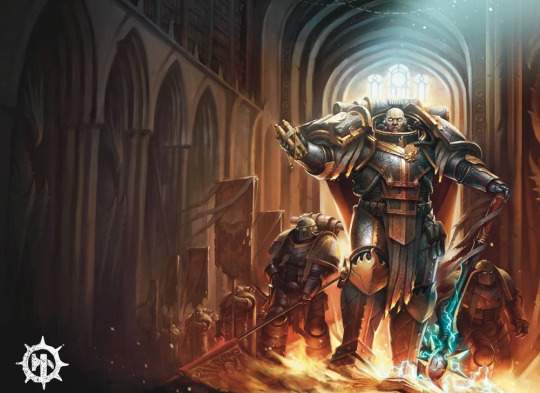
Sanguinius filled his form wrong. He managed to charm the investigating officer into allowing him to resubmit, but failed to file on the ground that he was murdered by Horus. A small percentage of Blood Angels are, to this day, afflicted with anxiety over an unfiled return.
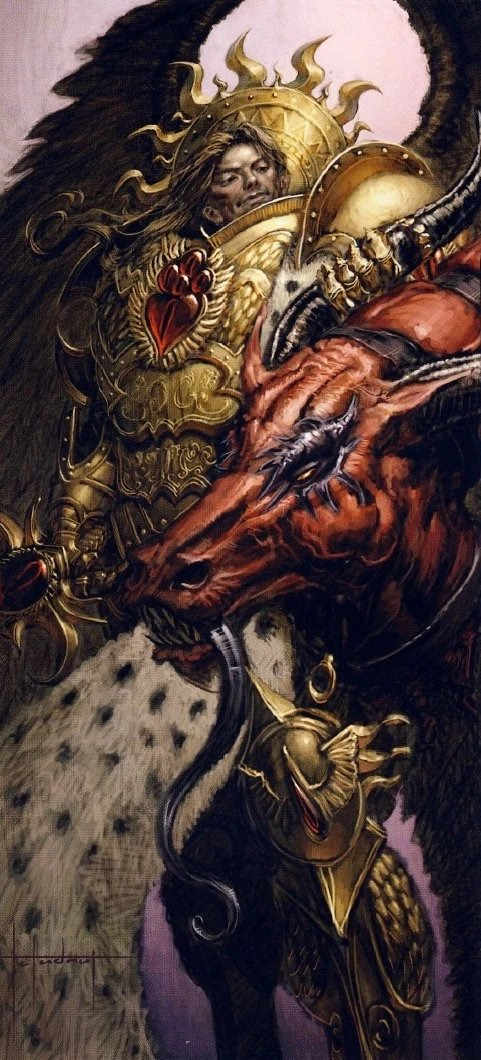
Roboute Guilliman 100% knows how to commit tax fraud, and how to get away with it. Of course he does. He's the tax man (Ultramar regional office). Hates Magnus for reasons we'll get to.
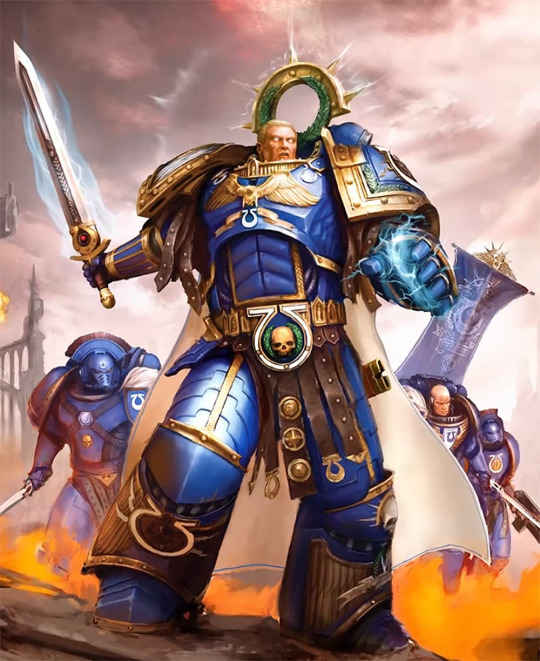
Jaghatai Khan neither knows nor cares what taxes are. The Imperial Revenue took years to track down his address, and after several final demands an investigator visited only to find a lone postbox 300 miles from anywhere, half buried in unopened mail.
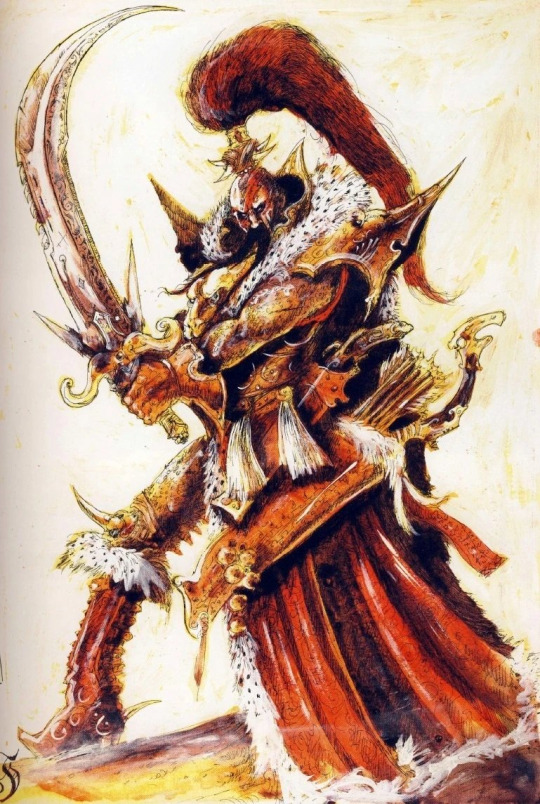
Perturabo failed to declare assets 'inherited' from Ferrus Manus and is currently awaiting a trial date.
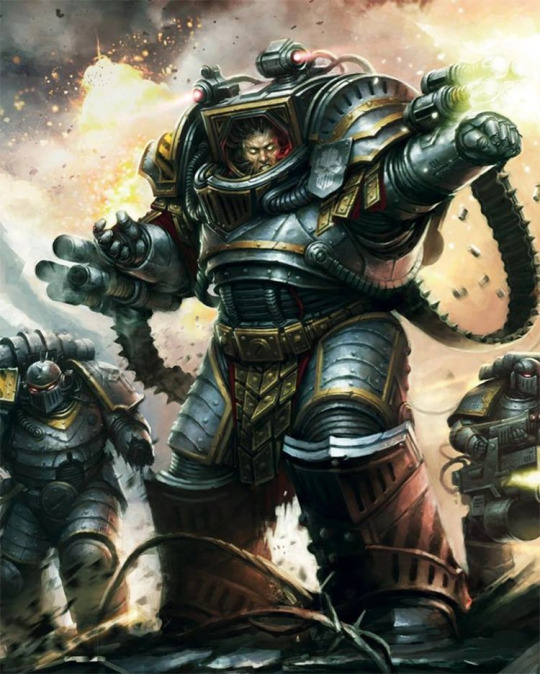
Ferrus Manus has been given dispensation to defer his return for the tax year on the following grounds:
Being dead.
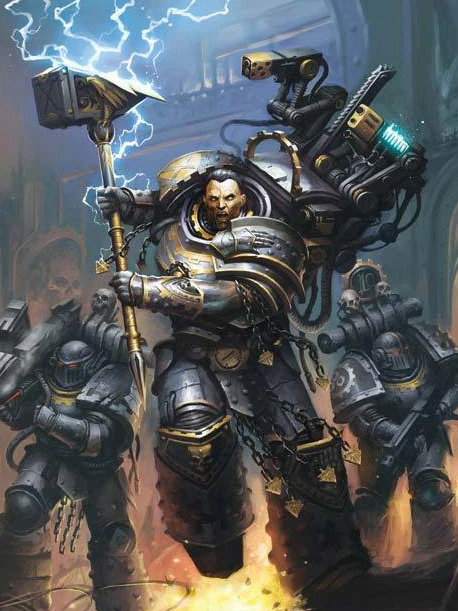
Lion El'Johnson swears he knows how to commit tax fraud but simply never would. He's lying. He has no idea but would rather walk naked into the Warp than admit it.

Vulkan keeps fastidious notes through the year which makes him very popular with his accountants. They try to convince him to expense his Drakeskin cloaks but he refuses as he wears them recreationally (despite the Salamander's 'business logo') and doesn't want to get into trouble.
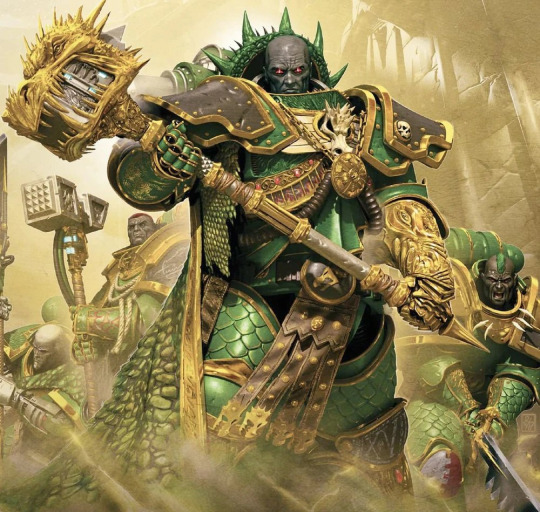
Fulgrim completed his return, he really did, but it wasn't right. Currently on his cogitator is 'Tax Return 3 FINAL (FINAL!!).tax' unsent.

Leman Russ vaguely understands that tax is a thing. Thus far nobody can decide if the Space Wolves mix of raucous hospitality and space Viking intimidation towards investigators is a concerted effort to avoid paying or if they're just like that.

Magnus has all the documentation to prove that he's paid. It's all right there. It makes absolutely no sense and somehow he's owed money? Guilliman is convinced he's full of it but hasn't been able to prove it and is quietly seething.
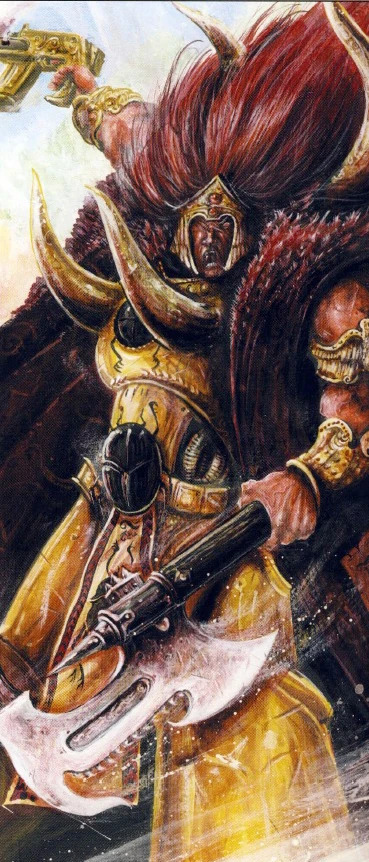
Rogal Dorn pays in full and fully hates anyone who doesn't. He grumbles about it to anyone who will listen, usually within earshot of anyone he suspects isn't paying his way. Magnus & Conrad vocally agree with him. Guilliman leaves the room before he says something he'll regret.
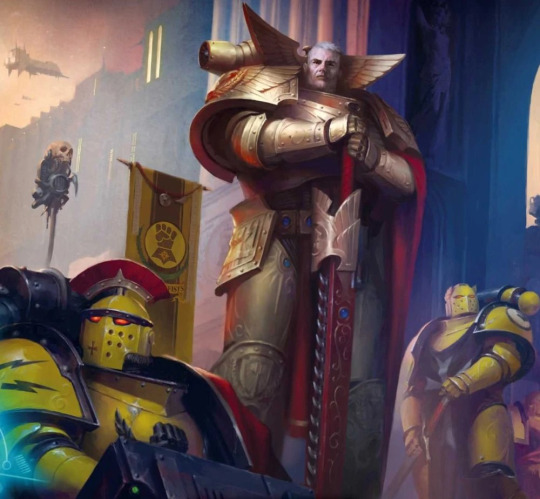
Alpharius definitely submitted a return. Nothing about it looks right, all the numbers are estimates, all the assets are in some kind of code but somehow it's already been stamped as accepted.
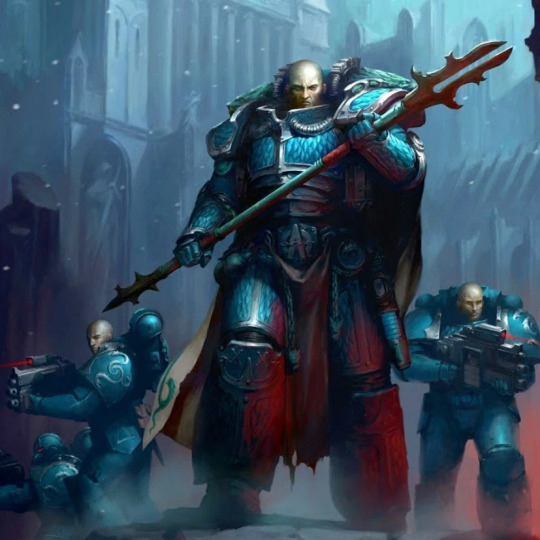
Konrad Curze also vocally hates anyone who doesn't pay up. Secretly he hasn't paid in years. He is beyond the pretty laws of 'taxes' and with everyone focused on Lorgar, Perturabo and Magnus he's just slipped through the cracks, which he has taken as a silent endorsement.
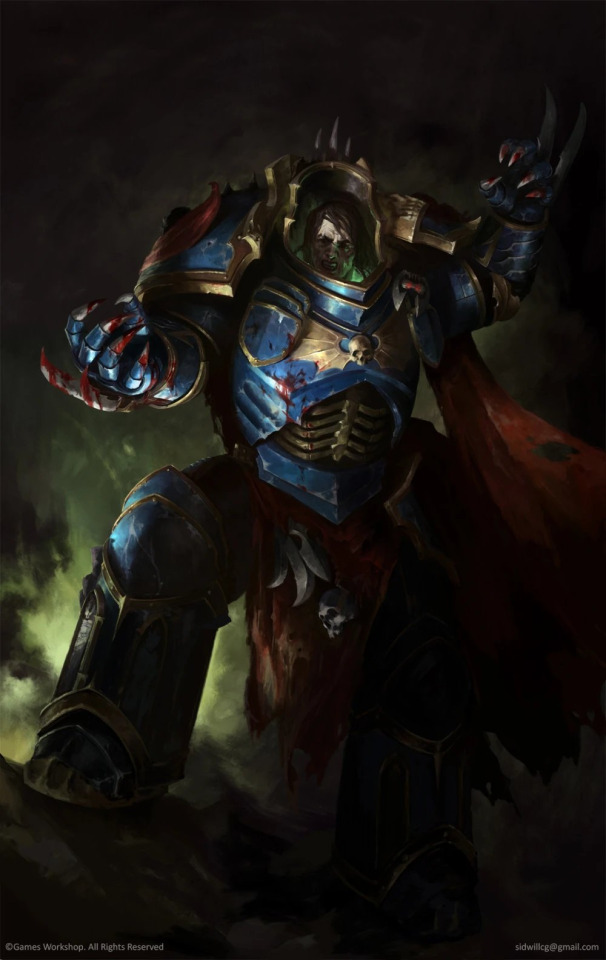
Corvus Corax wants to pay tax. He’s tried to pay tax. He’s sent several returns to the Imperial Revenue and still they haven’t taken the money. He’s beginning to get worried. He needn’t be. They have quite simply forgotten he exists and it's gone on too long for them to admit their mistake.
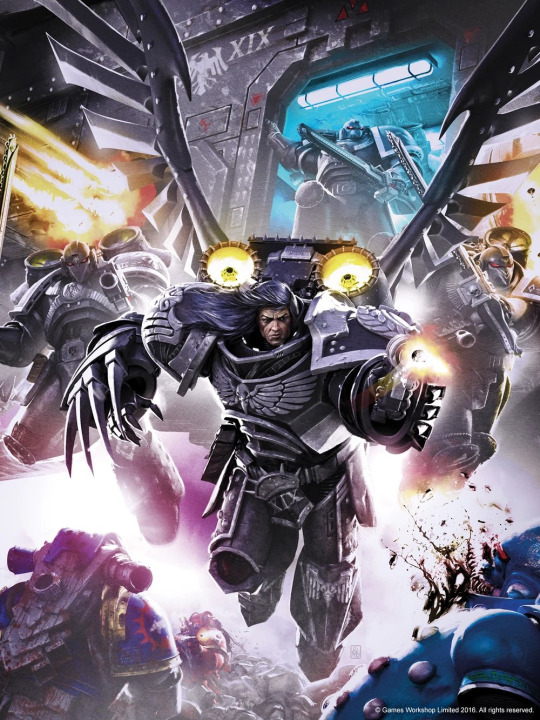
Mortarion pays but hates everything about it. He thinks it's a personal slight and is convinced he is paying more than everyone else. He's right. This makes his whining no less annoying.
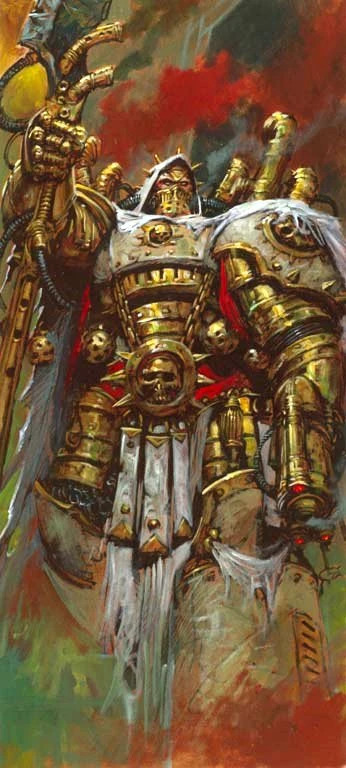
Angron had taxes explained to him once and ol' Rusty's sacrifice is why Imperial Revenue officers can wear jeans on Fridays. Since then the IR has practiced a bold 'hands off' approach with the World Eaters, proving that violence is sometimes an answer.
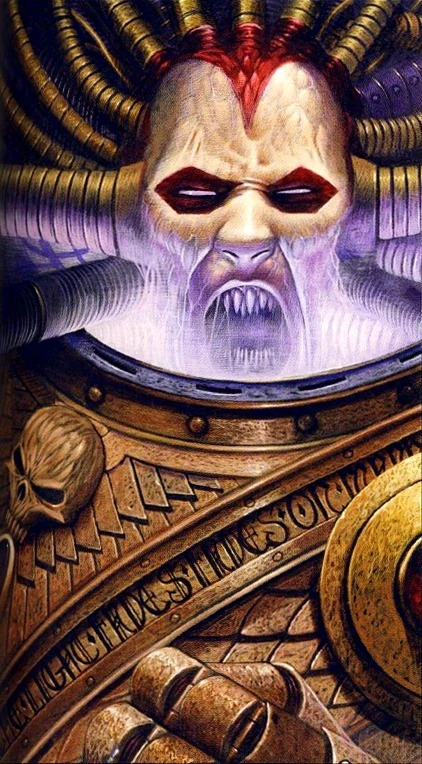
Horus absolutely pays his taxes. In Horusbux: A currency of his own devising. Lorgar attempted to trick Horus into a ponzi scheme, now all of his money is in Horusbux and he has no idea how it happened. Horus keeps on promising everyone massive returns, usually from the deck of his waryacht, the Live Forever II.
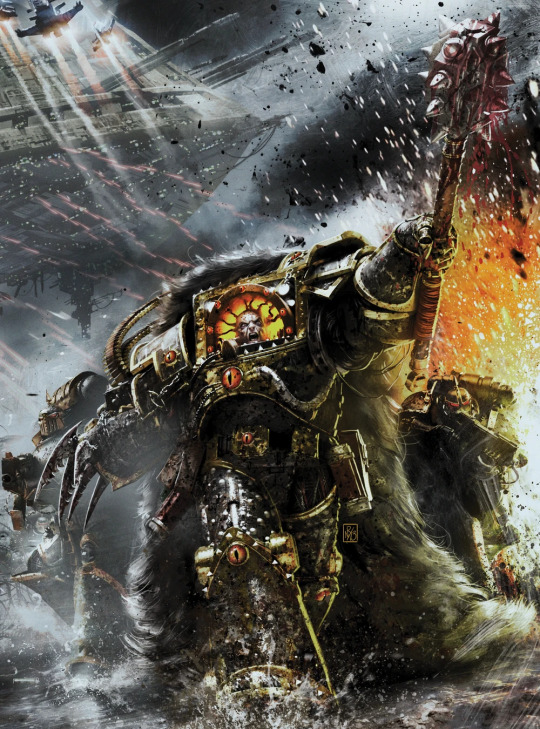
1K notes
·
View notes
Text
I've been following the Unity situation and its so fucking insane like holy shit. We have everything! - Absurd fees for devs! That may or may not be retroactive and illegal, but we won't say until you cause a stink about it! (We totally aren't shh we wouldn't break the law. Totally :) ) - Getting rid of one of their levels of subscriptions during all of this, The 'Plus Plan', and allegedly putting you on the more expensive 'Pro' subscription if you auto renew! - Insider trading! Selling their stocks not even a week before they released this new change in their company! x x They've since backpedaled from what their original plan was. Originally, they told everyone that every Install, reinstall, dlc, demo, and pirated copy would now cost a fee (with few exceptions, such as charity games and bundles) It's not hard to see how this could tank an indie company with ease. Mad at a dev/company? Just mass install/uninstall. Now they are apparently saying that 'nonono! We only meant the original install :)' Which also opens the door as to how they are tracking installs. They so far have seemed to be avoiding as to how on earth they are going to do that without breaching privacy on a computer. Especially when it could just be easier to make a fee based on purchases, but no. x

So you know, don't worry guys, they have their own 'proprietary data model.' But so far (As i type this, or am aware of) have not given details about how that model works. When asked about stuff such as Xbox Gamepass, Unity mentioned it would be Microsoft paying for the fees. As of now, I have no idea if Microsoft was even told this, and I doubt they are going to agree to it either out of nowhere. x Another fun thing, is if you change your Unity plan, you are added to the revenue threshold immediately. Interesting that this is after they sneakily got rid of their Plus plan, which a lot of devs seemed to use.

And interesting enough, they seem to contradict themselves from their QnA and their official twitter post regarding Demo's and Early Access, or at least tried to be sneaky about the wording?? x x


They won't charge for demos or early access, until they do, apparently. Or if the demo has data that can be transferred to the main game, anyway. Unity also claimed this would only affect 10% of its users. Which is funny when you look at all the Indie devs and studios who are coming out on twitter saying that this actually directly hurts them. Not to mention all the people that have spent years learning this engine, for themselves, or so they can apply to companies using it. And now all of that was just spat on by Unity themselves. There's also the games that have been out and are built on this engine, and can't just be tossed and rebuilt. Such as Among us, Genshin Impact, Pokemon Go and the Diamond/Pearl remakes. Overall, it's a huge mess. Unity majorly screwed up. I'd recommend looking into what games you like, and if they run on Unity. If you don't have them yet, you may want to purchase them so they are in your steam library, or whatever console you play on. With the uncertainty of all of this, I wouldn't be surprised if some companies delist their games on steam. If you buy from them now, you'll still be able to support the devs before Unity implements this new fee plan. Plus, since you paid for them, they will still be on your console/in your steam library. Please stay safe ya'll, and support your local game devs during this storm. They need it.
#unity#unity3d#indiegame#indiedev#game development#unity engine#video games#sorry for the long post#but i felt this was important#long post#zed.talks
258 notes
·
View notes
Text
Interest check for Physical Cherlene Album!
I’m a huge advocate nd fan of physical media and I believe has a certain importance for preservation for all different types of media out there. There has been an unfortunate rise of Archer disappearing from streaming sites, example being Netflix which has taken random seasons away. Usually this is a result of contract expiration within the shareholders, etc.. Since the show has come to an end, there is a huge possibility the contracts will not renew based on revenue. That being said there is already a handful of Archer “lost media” out there, also mentioning Danger Phone shutting down back in December most likely due to lack of revenue (RIP 💔💔😔), the only place you can find any sort of short or special features is on YouTube in low definition, or the Archer DVDs which only expand up to Danger Island, there are no physical copies of any media from Archer after the fact. I’ve tried archiving and saving as much as possible with the help of others as well.
I’ve had a project in mind for a few months now, as I come to appreciate physical media more, I’d love to produce a genuine Cherlene CD album. I know it’s available on pretty much all streaming platforms and there’s always the good ol’ 🏴☠️ ways, but there has already been alterations done to one of the tracks online, luckily the original is available and it would be replaced with the new on CD. Sometimes I love the feeling of just holding this stuff in my hands.
Though, this is a costly expense on my part but I’d love to give others a copies well. Even if most fans aren’t really interested this will still be a project for myself, that being said, I would be selling these at 20$ CAD a piece, plus shipping. The full album will include all the tracks, a glossy cover insert with backing as well as inside imagery in a standard jewel case, and a printed cover on the CD as well.
If you’re interested you can RB/Reply or send me a DM!
Outlaw Country forever! 🔥🔥
#archer fx#physical media#media preservation#honestly it’s risky to post this publicly but if I can bite the cost a little bit w/e
15 notes
·
View notes
Text
every once in a while i like to poke my head into "anti [x]" tags just to see what the other side thinks. recently i was looking through "anti ao3" and found a really funny post claiming that ao3 is not anticapitalist, but actually the Definition Of Capitalism, bc it relies on volunteer labor while supposedly having the money to pay a staff.
oh, honey.
but i am not going to make unsubstantiated claims on the internet, no, and this gives me an excuse to look at ao3's whole budget myself, which i've been meaning to do for a while. these numbers are taken from the 2022 budget post and budget spreadsheet.
ao3's total income for 2022, from the two donation drives, regular donations, donation matching programs, interest, and royalties was $1,012,543.42. less than $300 of that was from interest and royalties, so it's almost all donations. and that's a lot, right? surely an organization making a million dollars a year can afford to pay some staff, right?
well, let's look at expenses. first of all, they lose almost $37,000 to transaction fees right away. ao3 and fanlore (~$341k and ~$18k, respectively) take up the biggest chunks of the budget by far. that money pays for, to quote the 2022 budget post, "server expenses—both new purchases and ongoing colocation and maintenance—website performance monitoring tools, and various systems-related licenses."
in some years, otw also pays external contractors to perform audits for security issues, and for more servers to handle the growing userbase. servers are expensive as hell, guys. in 2022, new server costs alone were $203k.
each of their other programs only cost around $3,000 or less, and otw paid around $78k for fundraising and development. wait, how do you lose so much money on your fundraising?? from the 2022 budget post: "Our fundraising and development expenses consist of transaction fees charged by our third-party payment processors for each donation, thank-you gift purchases and shipping, and the tools used to host the OTW’s membership database and track communications with donors and potential donors."
then the otw paid an additional $74k in administration expenses, which covers "hosting for our website, trademarks, domains, insurance, tax filing, and annual financial statement audits, as well as communication, management, and accounting tools."
in case you weren't following all of that math, the total expenses for 2022 come out to $518,978.48. woah! that's a lot! but it's still only a little over half of their net revenue. weird. i wonder what they do with that extra $494k?
well, $400k of it goes to the reserves, which i'll get to in a second. the last $93k, near as i can tell, gets rolled over to the next year. i'll admit this part i'm a little unsure about, as it's not clear on the spreadsheet, but that's the only thing that makes sense.
the reserves, though are clear. the most recent post i could find on the otw site about it were in the board meeting minutes from april 2, 2022: "We’re holding about $1million in operating cash that is about twice the amount of our annual operating costs. There is another $1million in reserves due to highly successful fundraisers in the past. The current plan for the reserves is to hold the money for paid staff in the future. It’s been talked about before in the past and we’re still working out the details, but it’s a rather expensive undertaking that will result in large annual expenses in addition to the initial cost of implementation."
woah....they're PLANNING to have paid staff eventually! wild!
so let's assume, for easy numbers, that the otw currently has $1.5 million in reserves. before we even get to how to use that money, let's look at the issues with implementing paid staff:
deciding which positions are going to be paid, because it can't be all of them
deciding how much to pay them, bc minimum wage sure as hell isn't enough, and cost of living is different everywhere, and volunteers come from all over the world
hiring staff and implementing new systems/tools to handle things like payroll and accounting
making sure you continue to earn enough money both to pay all of the staff and have some in reserves for emergencies or leaner donation drives
probably even more stuff than that! i don't run a nonprofit, that's just what i can think of off the top of my head.
okay, okay, okay. for the sake of argument, let's assume there is a best-case scenario where the otw starts paying some staff tomorrow. how much should they be paid? i'm picking $15 an hour, since that's what we fought for the minimum wage to be. by now, it should be closer to $20 or $25, but i'm trying to give "ao3 is capitalism" the fairest shot it can get here, okay?
ideally, if someone is being paid to help run ao3, they shouldn't need a second job. every job should pay enough to live off of. and running a nonprofit is hard work that leads to a lot of burnout--two board members JUST resigned before their terms were up. what i'm saying is, i'm going to assume a paid otw staff is getting paid for 40 hours of work a week, minimum. that's $31,200.
at $400,000 per year, the otw can afford to pay 12 people. that's WITHOUT taking into account the new systems, tools, software, etc they would have to pay for, any kind of fees, etc, etc.
oh, and btw, if you're an american you're still making barely enough to survive in most places, AND you don't have universal healthcare, vision, or dental. want otw to give people insurance, too? the number of people they can pay goes down.
it's. not. possible.
a million dollars is a lot of money on the face of it, but once you realize how MUCH goes into running something like the otw, it goes away fast.
just for reference, wikipedia also has donation drives every year. wikipedia, as of 2021, has $86.8 million in cash reserves and $137.4 million in investments. sure, wikipedia and ao3 are very different entities, but that disparity is massive. and i should note that if you give $10 to wikipedia they don't give you voting rights, i'm just saying.
by the way, you may have noticed that i didn't mention legal costs at all here. isn't one of otw's big Things about how they do legal advocacy?
yes, it is. they have a whole page about that work. and i can't for the life of me find a source on otw's website (and i'm running out of time to write this post, i'll look harder later), but i am 90% sure i learned before that most, if not all, of otw's legal work/advice/etc is done pro bono. i've also seen an anti-ao3 person claim their legal budget is only $5k or so, but they didn't have a source. but keep in mind that if they don't have a legal budget, all the numbers above stay the same, and if they do, there is even less money available for paid staff.
you can criticize ao3 and the otw all you want! there are many valid reasons to criticize them, and i do not think they're perfect either. but if you're going to do so, you should at least make sure you can back up your claims, bc otherwise you just look silly.
#ao3#otw#anti ao3#bc i want them to see this#otw board#ao3 discourse#ao3 donations#wren wrambles#that post was so unserious i died#if it was more recent (its from mid-july) i wouldve replied directly maybe#but i didnt want to drag the body of a 6-note post into the light OR attack the op directly so#also! if i misunderstood something pls let me know im doing my best
205 notes
·
View notes
Text
WHY DYSTOPIA MUST BE BORING TO SUCCEED
The "Boring Dystopia Strategy" is a highly strategic and often subtle method employed by those in power to create an enduring, all-encompassing authoritarian government. The genius of this approach is that it doesn't look like a dystopia at first glance. Each step toward oppression is disguised as a necessary solution to a societal problem, creating a series of small, unassuming changes that collectively transform society into a high-surveillance, debt-ridden, and highly regulated landscape. The result is a quiet but relentless march towards a government structure that controls nearly every aspect of daily life, cloaked in the language of safety, responsibility, and "public good."
Key Components of the Boring Dystopia Strategy
Enhanced Surveillance as Crime Prevention Surveillance systems are marketed as tools to make communities safer. The rationale is straightforward: if there are cameras everywhere, criminals are less likely to act. At first, this seems like a good idea. However, as surveillance expands, it reaches a point where privacy no longer exists—every action and interaction is tracked and recorded. People's movements, purchases, conversations, and even thoughts (through social media and data mining) become data points in a government database. The population is conditioned to accept surveillance under the guise of crime prevention, even though the surveillance network eventually exists to deter any resistance to the growing system of control.
Financial "Disincentives" as a Form of Behavior Control Insurance companies, incentivized by government policies, implement "dynamic" pricing models that penalize risky behavior. Drivers with even minor infractions, young drivers, or anyone with imperfect credit face skyrocketing insurance costs. While it’s presented as a means to reward safe drivers and reduce accidents, it’s ultimately a method of forcing people into line. Over time, these small financial penalties accumulate, and as people find themselves unable to afford the rising costs, they are pushed further into debt or forced to depend on the very government that created the conditions of their hardship.
The Department of Bureaucracy: A Growing Web of Useless Jobs New laws and regulations are introduced to solve every conceivable social issue, resulting in bloated departments filled with superfluous workers whose roles add no real value to society. The justification is often to create jobs and stimulate the economy, but these positions end up creating layers of bureaucracy that slow down meaningful progress. This web of inefficiency puts financial strain on both the government and the people, leading to higher taxes and fees. With each new law or regulation, the cost of compliance grows, straining both businesses and individuals who can't afford to play by an ever-increasing list of rules.
Rising Cost of Living as an Inevitable "Economic Shift" As government regulations add costs to every industry, prices naturally increase. This is explained away as the cost of progress or as an unfortunate byproduct of addressing critical social issues, like "ethical sourcing" or "green initiatives" that are actually revenue-boosters for corporations. As inflation rises and wages stagnate, the lower class is squeezed financially. Each attempt to improve their situation—whether by taking a second job or reducing expenses—is offset by further price increases or surprise taxes. This creates a cycle where economic mobility is nearly impossible, locking the lower class in place.
Debt as a Tool for Control As the cost of living rises, debt becomes unavoidable for many. Loans, credit cards, and financing options are promoted as solutions, pushing people into a system of lifelong debt repayment. With growing financial obligations and little hope of ever breaking free, individuals are forced to work harder, often taking on additional jobs, which leaves them with less time and energy to question or resist the system. Debt chains the population to the very system that oppresses them, creating a sense of dependency on government stability, even as that stability is the source of their financial despair.
The Final Stage: Disempowerment Disguised as "Efficiency"
As the population is weakened by financial strain, endless surveillance, and a tangled bureaucracy, the final stage involves introducing measures to "simplify" governance. This might mean fewer elected officials, streamlined decision-making processes, and the merging of regulatory bodies for "efficiency." In reality, this final stage centralizes power even further, leaving those at the top with almost unchecked authority, a situation that the people, too exhausted and indebted to resist, accept as necessary.
The Boring Dystopia Strategy works because it does not announce itself as an authoritarian takeover. Instead, it subtly shifts the balance of power by presenting every oppressive measure as a solution to a social ill. And because each step is introduced slowly, over decades, the population becomes accustomed to the new reality, accepting surveillance, debt, and regulation as the normal costs of a safe and responsible society. By the time people realize the extent of their powerlessness, the dystopian state is fully entrenched, with every escape route closed off.
12 notes
·
View notes
Text
i am literally so tired of the multiple album variants discourse. just don't buy them!!! i haven't purchased a single piece of physical media of taylor's since 1989 (honestly i think that was even gifted to me) and i have had no problem accessing any music of hers i've wanted to listen to ever. if you want to be a collection completionist, that's your choice. if it's becoming too expensive, it can be your choice to stop!!! nobody is forcing your hand. taylor does not have a moral obligation to put out fewer things so you can have all of them, she's a capitalist billionaire and she's not secretive about that. like it's valid if it hurts your feelings that you can't afford everything, I guess, but genuinely why are we stillllllllll talking about this. like im just having fun looking at the pretty pictures knowing damn well im not going to buy a single one of these and will be streaming them and taylor will be a-ok with my streaming revenue rather than the revenue from my album sales. and as for the bonus tracks? i love piracy and she knows 100% that people who listen only on streaming but WANT to hear those will be listening to pirated versions...like she already leans in to the fact that there's thousands of people watching concert livestreams every night. she understands how the internet works. she is not missing those sales. we already know it's going to be the biggest album of the year and break records bc she's taylor fucking swift and everything she touches turns to gold. she's just having fun making more little content things to release bc that's how she knows to interact and excite us now. you don't have to buy them if you don't want to. like...genuinely start trying to change your perspective on this, y'all are making yourselves soooo upset and it makes me sad for you. not in a mean way, but in a like...you should be having fun, how can i help you have fun way. y'know. stream music, interact with fandom, you don't have to buy everything to be a fan.
51 notes
·
View notes
Text
The Power of Data Analysis and Integration for Your Business: Why You Need to Start Now
To keep your trucking business financially healthy, it’s crucial to track revenue and expenses accurately. Data analysis helps you monitor income from various brokers and customers, and keep a close eye on every cent of your expenses. By integrating financial data from multiple sources, you get a clear picture of your cash flow, enabling you to make smart decisions. We touched on this topic once…

View On WordPress
#automated reminders#brokers#business#business operations#cash flow#cash flow management#credit reports#Creditworthiness#customers#data analysis#data integration#expense tracking#financial data#financial health#financial metrics#Freight#freight industry#Freight Revenue Consultants#income sources#logistics#operational data#payment patterns#payment terms#profitability#small carriers#strategic decisions#timely payments#track expenses#track revenue#Transportation
0 notes
Text
Exploring the Best Cash Flow Forecasting Tools: A Comprehensive Comparison
Are you fed up with the financial uncertainty affecting your business? Do you wish there was a way to easily monitor and precisely predict your ins and outs, allowing you to make well-informed decisions about the next steps for your small business?

If so, you're in for a treat! Prepare to transform your financial management and planning as we explore cash flow forecasting with the industry's best tool, Moolamore. Discover its amazing features, advantages, and everything in between. This comprehensive blog guide will explain why this is the solution you've been searching for.
#cash flow forecasting tool#best cash flow forecasting software#financial forecasting software#budgeting tool#financial planning software#cash flow management tool#money management tool#business forecasting software#revenue forecasting tool#financial analysis tool#expense tracking software
0 notes
Text
I'm not a "birder." I simply enjoy sitting outside, in the yard, in the forest, in the desert valley or mountains, or, when it's cold or crappy outside, in the house watching the birds. Most of the time, I have my iPhone camera or Nikon ready for that fun photo. I participate in the annual Bird Count, and another volunteer-based research effort to keep track of bird numbers and migration, but I don't go lugging around with binoculars and a spiral notebook keeping track and trying to "up the numbers" of birds I see. Along with my wife and family members, I do it, because I/we enjoy the outdoors. But.....even that can be expensive. A couple of days ago, I noticed that we were running low on bird seed for our feeders (four suet feeders, three thistle feeders for the finches, and five regular feeders for all the birds.......and squirrels), so I went to Menards (equivalent to Home Depot) and bought a lot of bags of different kinds of seed and suet to carry us through three or four weeks, and spent almost $160.00. Whoa! (That included a bag of peanuts for the squirrels. I know I'm not supposed to feed them, but when I feed the birds, the squirrels notice, and a couple or three of the squirrels tug on my boot lace or jump on my leg, or do that beg thing they do, I pay attention.)
Excerpt from this story from Inside Climate News:
In 2022, around 96 million people in the U.S. closely observed, photographed or tried to identify birds in the wild—activities known broadly as birding. For context, that means more than 35 percent of the country’s population aged 16 and over are birders.
It turns out this staggeringly popular hobby adds up, according to a November report from the U.S. Fish & Wildlife Service (FWS). The report found that birders in 2022 spent an estimated $107.6 billion on expenses related to their pursuits—from buying equipment like binoculars to travel costs for visiting bird hotspots. That’s almost six times the total revenue generated by the National Football League that year.
This report shows that birding is a boon for local economies, a trend that can be seen around the world as the avian pastime continues to pick up steam and offers a sustainable revenue source for rural communities. But birders aren’t just chipping in financially; these hobbyists provide crucial data for scientists as climate change pummels global bird populations.
The new report is an addendum to the 2022 National Survey of Fishing, Hunting, and Wildlife-Associated Recreation, published last year, which details the participation rate of Americans in recreational activities, including hunting, fishing and wildlife watching. For the addendum, FWS economist Erin Carver dove more deeply into birdwatching participation specifically to get a better understanding of the demographic and financial ins and outs of the activity in the U.S.
I read through the report and wanted to highlight a few more of the key data points that stuck out. People in the U.S. spent a combined 7.5 billion days birding in 2022, with a range of destinations. Some birders might head out for long trips to see puffins in Alaska, while others simply watch warblers flit through their backyards.
6 notes
·
View notes
Note
Why is that every Mayor of NYC, regardless of party, becomes some variety of a--hole? Are there examples of non-a--hole NYC mayors?
This seems a bit facile to me, and overlooks the nuances of a lot of NYC history. So let's look through the last fifty years of mayors and see whether it's actually true that they all become an asshole.

John Lindsay (1966-1973):
Like a lot of mayors in this period, Lindsay's main problem was NYC's long-term economic and demographic decline and the knock-on effects on the city's finances and resulting conflicts over public spending. To give him credit, while Lindsay did start the process of borrowing from Peter (the capital budget) to pay Paul (current expenses) and taking on debt to cover the hole in the capital budget, he also tried to deal with the problem by lobbying the state legislature to let him raise taxes and thus increase revenues.
That being said, the hate that Lindsay got as mayor, and he got a lot, didn't come from balanced-budget advocates. It came from white people in the outer boroughs who hated the fact that Lindsay tried to desegregate the city by pushing scatter-site public housing, that he backed a civilian complaint review board, and was otherwise viewed as being too sympathetic to black people, Latinos, and hippies.
Verdict: not an asshole. Fuck the haters.

Abe Beame (1974-1977):
The first (observant) Jewish mayor of NYC, Beame was a man tortured by the contradictions between his desire to maintain NYC's social democratic traditions and the awful economic situation he inherited. Beame became mayor during the 1973-1975 recession, which was at the time the worst since the Great Depression, and pretty much immediately had to deal with the NYC Fiscal Crisis, and was also mayor during the 1977 Blackout because clearly the Fates just fucking hated this guy.
If Lindsay was hated by white people for being too friendly with black people, Beame brought white people and black people together in their hatred of him for his public sector layoffs, his wage freezes, and his cuts to public spending. And while it's true that Beame absolutey adopted the logic of austerity and should be criticized for that, it should also be remembered that he was dealing with a well-organized and highly politicized capital strike that was backed up at the Federal level by the Ford Administration.
Verdict: kind of an asshole, but largely because he got mugged by Wall Street and the White House.

Ed Koch (1978-1989):
I think Ed Koch is the first person so far on this list that I'd call a genuine asshole (albeit a popular asshole for much of his career, hence his three terms). Starting with the fact that he got his start as a crusading left-wing politician in the Village and then abandoned his principles to run as a "law and order" candidate in the 1977 mayoral election, Koch had a long track record of running to the right whenever it benefited him personally, no matter who it hurt.
So what's on Koch's list? Well, we've got more budgetary austerity for working people while hiring thousands of more cops, starting the process of handing over the city to the developers, his opportunistic support for the death penalty, the massive corruption scandals in the Transportation and Parking departments, ettc.
However, I think the single biggest black mark on Koch's record is his abysmal handling of the AIDS crisis. Despite being a (closeted) member of the LGBT+ community, or perhaps because of it, Koch was both inactive and silent on the epidemic for years. Not only did the city spend almost no resources to deal with AIDS in the crucial early years, but a lot of ugly shit happened in NYC public hospitals that mayoral intervention could have put a stop to - but Koch did nothing.
There is a good reason why, if you talk to surviving ACT-UP members today about Ed Koch, they will spit at the mention of his name.
Verdict: asshole.
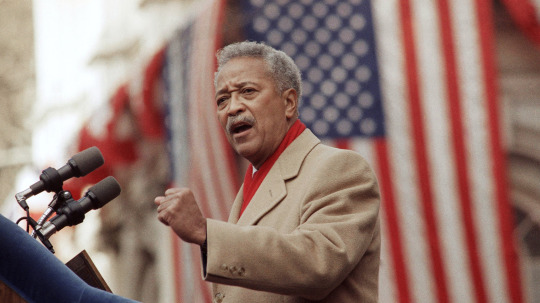
David Dinkins (1990-1993):
New York City's first black mayor, Dinkins reminds me a lot of John Lindsay, in the sense that his detractors were overwhelmingly motivated by racial animus refracted through the lens of policing. The fact that crime rates in NYC began to drop significantly during his tenure as mayor (well before Guiliani), or that he massively expanded the police force - none of that matters because he tried to make the Civilian Compliant Review Board legitimately civilian and independent of the NYPD.
That was enough to touch off a massive, and openly racist, police riot at City Hall, which Guiliani happily attended to stoke the flames of resentment against a black mayor who dared to tell the NYPD what to do.
Verdict: not an asshole. Fuck the haters.

Rudy Guiliani (1994-2001):
In the wake of the 2020 election, a lot of columnists wrote breast-pounding op-eds, asking themselves what went wrong that America's Mayor had seemingly lost his mind in service to the Trump campaign.
As someone who grew up in Guiliani's New York, let me state with confidence: he was always a fascist loon, he just used to be better at it. Having ridden a wave of racist law-and-order politics to victory, Guiliani took personal credit for the decline in crime rates that was taking place nationally - to the point where he actually fired Bill Bratton for being more popular than him - and established the "Broken Windows" policy that would give rise to "Stop and Frisk."
Guiliani's alliance with the NYPD was based on the understanding that he would vocally take the NYPD's side in any police shooting or brutality case no matter how blatantly unjustified and depraved it might have been, whether that was the shootings of Amadou Diallo or Patrick Dorismond or Gidone Busch, the torture of Abner Louima, the racial profiling of the plainsclothes Street Crime Unit, and on and on.
And then there's the fact that, having made the frankly insane decision to place the Office of Emergency Management headquarters at the World Trade Center (this after the 1993 bombing), Guiliani took a frankly unwarranted level of press adulation at a time of national trauma and used it to try to illegally install himself as the unelected mayor of New York City.
Verdict: fascist asshole.

Michael Bloomberg (2002-2013):
More genteel and a better administrator than his predecessor, Bloomberg nevertheless pursued a raft of policies that were largely harmful to NYC. His housing and economic development strategies were designed to market NYC as a "luxury good" to the world's economic elite - seriously, read up on the history of the Hudson Yards development - to the detriment of affordability, beginning the process of gentrification that has left much of this city unaffordable to the majority of residents.
The main thing that makes Michael Bloomberg an asshole is his record on policing, where he doubled down on the "stop and frisk" strategies of Rudy Guiliani, going to the absolute wall in defense of them even when the courts began to knock them down as blatantly racially discriminatory. Then add to that his creation of a massive surveillance state aimed at NYC's Muslim population.
He routinely used his wealth to bribe would-be critics into silence, and then strong-armed the City Council into letting him run for a third term.
And there's the fact that he still owes me $200.
Verdict: plutocrat asshole. Where's my money, Michael? Where's my fucking money?

Bill De Blasio (2014-2021):
I've gone on record as saying that Bill De Blasio's first term was actually remarkable for progressive policy accomplishments, from establishing universal pre-K to raising the city's minimum wage to capping rents to ending stop-and-frisk, and so on and so forth.
That being said, there were two forces in New York politics that he was never able to deal with: the first was the rampant hostility of the NYPD (I was never much impressed by De Blasio's failure to stand up to the NYPD; say whatever else you will about David Dinkins, but he didn't mince words when thousands of drunk cops screaming the N-word invaded City Hall), and the second was the constant and malicious obstruction of supposedly Democratic Governor Andrew Cuomo on every single conceivable political and policy issue.
However, at some point very soon after his re-election in 2017, he just lost interest in being mayor of New York City. He still turned up for work, but even his political allies could tell that he had mentally checked out. If you're going to seek the job, you gotta do the job.
Verdict: not an asshole for four years, then an asshole for four years.
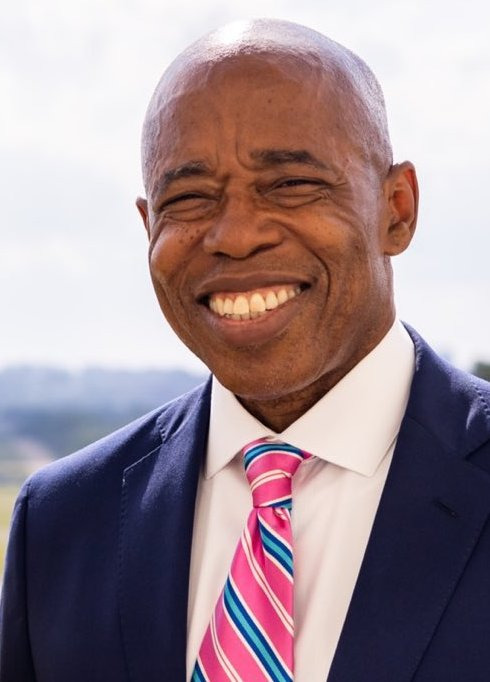
Eric Adams (2021-now):
Terrible on every conceivable aspect of public policy, but especially policing (because he's an ex-cop who ran on law-and-order politics and then found that didn't stop people carrying out random shootings) and housing (because he's an absentee slumlord who keeps getting fined for rats in his buildings).
Believes in crystal magic.
Verdict: asshole, possibly crazy?
133 notes
·
View notes